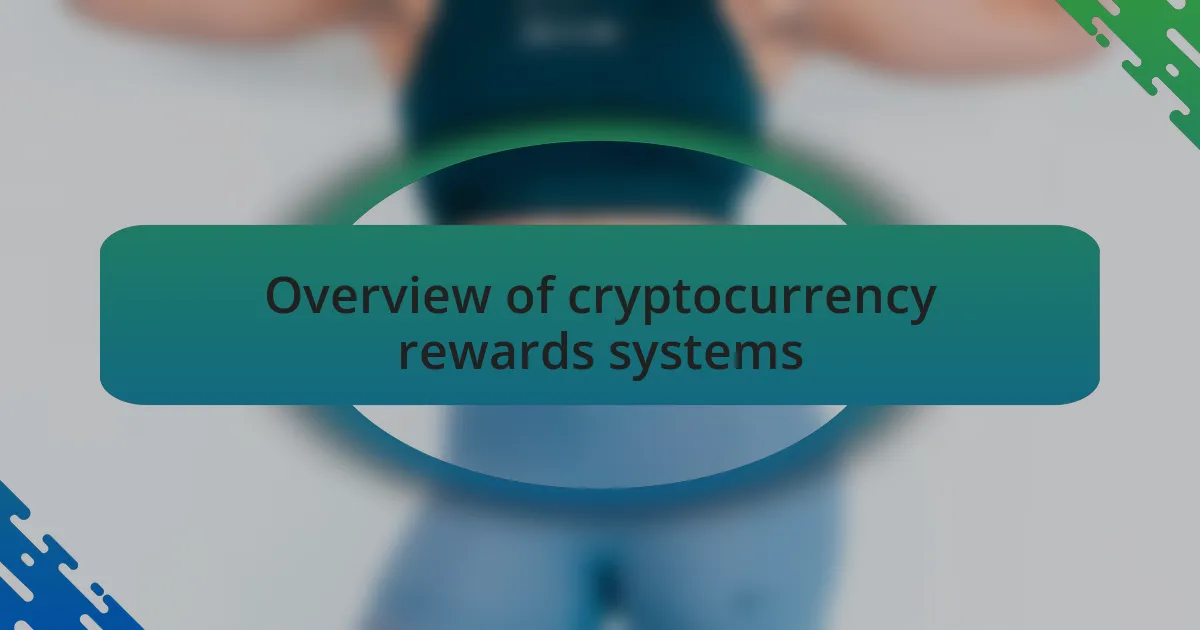Key takeaways:
- Health blockchain technology empowers patients with secure, controlled access to their medical records, enhancing privacy and trust in healthcare.
- Cryptocurrency reward systems in fitness incentivize healthy behaviors, fostering community engagement and motivation through gamification.
- While fitness rewards can promote healthier choices, ethical concerns arise regarding data privacy, accessibility, and the potential pressure to overexercise.

Understanding health blockchain technology
Health blockchain technology is a game changer in the way we manage personal health data. Imagine being able to access your medical records securely, without having to sift through piles of paperwork or waiting for a doctor’s office to send you an email. This technology acts as a secure digital ledger, allowing for transparent, tamper-proof records that can enhance patient care and trust.
I remember the first time I learned about the potential of blockchain in healthcare at a tech conference. It was enlightening to realize that patients could control their health information, granting access only to those who need it. Isn’t it refreshing to think about a future where you can manage your data actively, rather than just reacting to healthcare providers’ demands?
Moreover, I can’t help but wonder about the implications of this technology on patient privacy. With every transaction recorded in a decentralized manner, what does that mean for our sensitive health information? Honestly, it’s a double-edged sword—while we gain control, there’s an ongoing discourse about balancing accessibility with confidentiality. How we navigate these concerns will shape the future of healthcare.

Overview of cryptocurrency rewards systems
Cryptocurrency reward systems are increasingly appealing in various sectors, including fitness and health. These systems incentivize users by rewarding them with digital currencies for specific actions, such as reaching fitness goals or maintaining a healthy lifestyle. I’ve often found myself motivated to hit the gym when I know I can earn rewards that might translate to discounts or future purchases.
One of the exciting aspects of these reward systems is their potential to foster community engagement. Users can track their fitness achievements on a blockchain network, creating a supportive environment where participants can encourage one another. I can remember when I joined a health app program that offered rewards. The competitive spirit it ignited among friends made workouts feel less like a chore and more like a fun challenge.
Furthermore, the transparency and security that come with blockchain technology can enhance trust in these reward systems. Imagine being able to see exactly how your rewards are earned and spent in real-time. It’s a comfort knowing that your efforts are recognized and documented accurately, but I can’t help but ask: will this trend change our motivation for healthy living? Will earning digital tokens become prioritizing over intrinsic motivation? It’s an intriguing question worth pondering.

Benefits of fitness cryptocurrency rewards
The benefits of fitness cryptocurrency rewards extend beyond motivation; they can actually create lasting habits. I vividly remember the first time I earned tokens for every mile I ran. It felt like a game, transforming my routine into an enjoyable experience rather than a chore. Have you ever found that something you once dreaded became exciting simply because there was a reward attached? That’s the beauty of gamification in fitness.
Moreover, these rewards can lead to healthier choices in everyday life. When I started receiving cryptocurrency for my workouts, I began to seek out healthier food options and engage in more outdoor activities. It became a cycle of positivity—one healthy decision would lead to another. Isn’t it fascinating how financial incentives can reshuffle our priorities? This mindset shift can have significant implications for overall well-being.
Finally, I really appreciate that these rewards can enhance personalization in fitness journeys. I recall when a platform tailored my reward system to include my favorite types of exercises and diets, making the experience feel uniquely mine. How motivating is it to receive rewards that align so closely with personal preferences? This kind of customization not only keeps me engaged but also reinforces my commitment to health in a way that feels authentic.

Ethical concerns in fitness rewards
There are significant ethical concerns surrounding fitness cryptocurrency rewards, particularly regarding privacy. I often wonder how much data I’m inadvertently giving up when I engage with these platforms. With every workout tracked and every step counted, personal health data can become a hot commodity. Are we comfortable with corporations profiting from our most intimate health details?
Another concern is the potential for inequality in access to these rewards. Not everyone has equal opportunities to engage in the activities that earn cryptocurrency. I recognize that while some of my friends might thrive on gym memberships, others struggle to find safe spaces for physical activity. How can we ensure that the benefits of fitness rewards aren’t just a privilege for the already active but are extended fairly to all?
Additionally, the gamification aspect can sometimes blur the line between encouragement and coercion. When I first joined a fitness rewards program, I accidentally pushed myself too hard just to reach the next reward tier. There’s a thin line between motivation and pressure, and I think it’s crucial for these systems to promote healthy habits without fostering a harmful obsession with earning. Isn’t it essential to consider the well-being of participants over the potential for increased engagement?